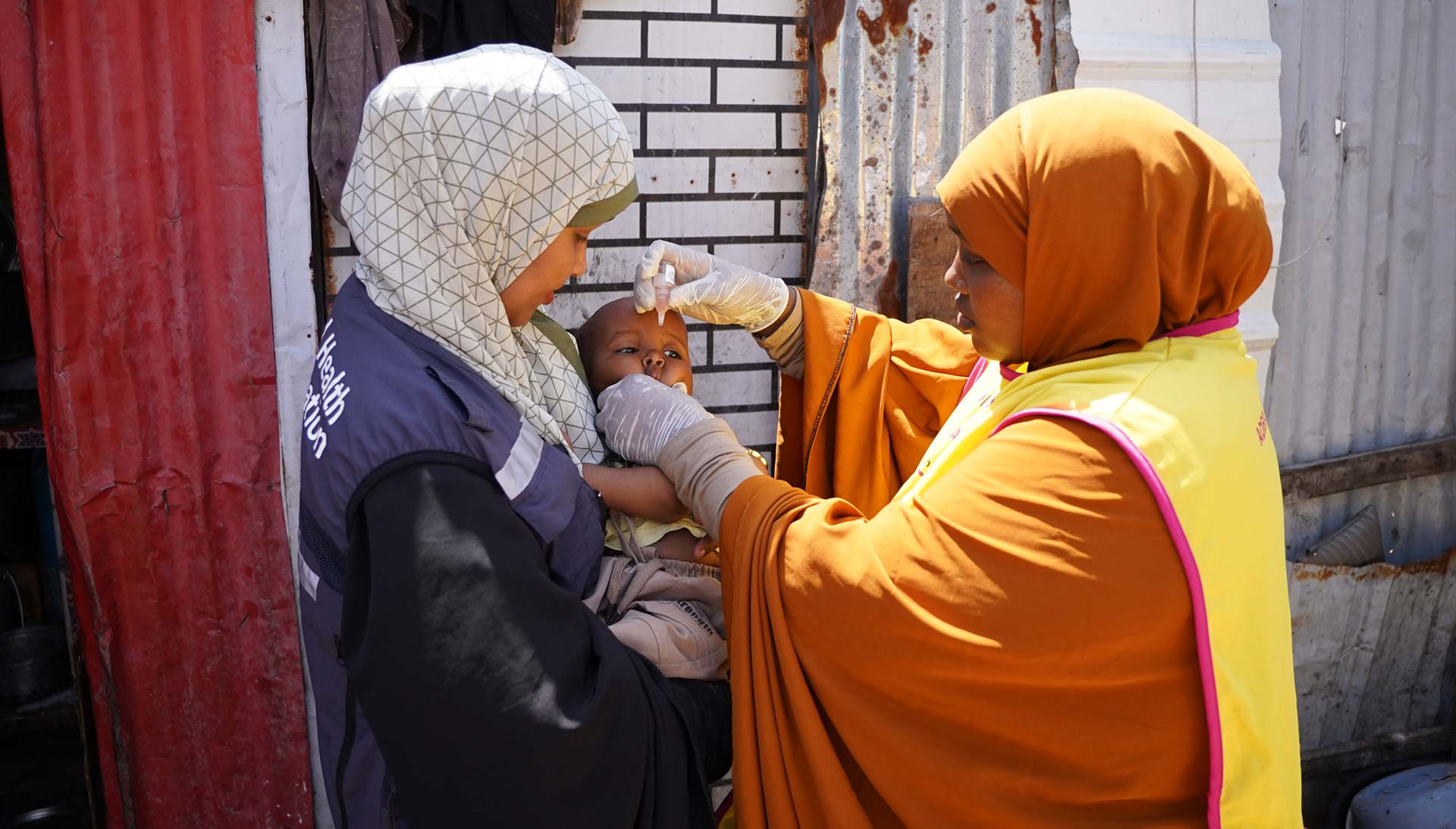 13 October 2025 – Across the Eastern Mediterranean Region, millions of children are growing up with no protection against deadly but preventable diseases. These zero-dose children – more than 14.3 million between 2019 and 2024 – have yet to receive a single routine vaccine.
13 October 2025 – Across the Eastern Mediterranean Region, millions of children are growing up with no protection against deadly but preventable diseases. These zero-dose children – more than 14.3 million between 2019 and 2024 – have yet to receive a single routine vaccine.
Safe, effective and affordable vaccines have been available for decades, yet measles and rubella are endemic in several countries in the Region. Accelerated and coordinated action is urgently needed to close these immunity gaps which are most pronounced in communities facing conflict, poverty and displacement and served by fragile health systems. Without protection, children are highly vulnerable to measles, rubella, polio and other vaccine-preventable diseases that can cause lifelong disability or death.
Yara’s story
Schoolteacher Farah had always dreamed of singing lullabies to her baby, just as her mother and generations before had done. But her daughter, Yara, now 3 years old, has never heard her mother’s voice. She lives in a world of silence, a result of profound hearing loss caused by congenital rubella syndrome (CRS).
CRS happens when a pregnant woman becomes infected with rubella and passes it on to the fetus. Yara and Farah’s story is a reminder of how lack of access to a crucial vaccine can cast a shadow across generations.
A simple rubella vaccination protects against CRS, but the vaccine wasn't accessible when Farah was a child. Yara is one of many children facing congenital anomalies because
her mother was not protected against rubella virus during pregnancy.
We cannot allow millions of children across the Region to remain unprotected from preventable diseases.
In contexts where immunity gaps persist, measles remains a severe public health threat. A highly contagious airborne disease, measles can cause serious complications, including pneumonia, encephalitis, lifelong disability and death. And though rubella may seem mild, when contracted during pregnancy it can cause CRS, leading to severe birth defects, deafness and blindness.
Immunity gaps fuel outbreaks, overwhelm health systems and roll back years of public health progress. Ninety per cent of zero-dose children in the Region live in just 5 countries – Sudan 30%, Yemen 23%, Afghanistan 17%, Pakistan 14% and Somalia 6%. While all 22 countries and territories in the Eastern Mediterranean Region provide measles vaccine, coverage has stalled in recent years. Eighteen countries have introduced rubella vaccine; that 3 have yet to do so keeps elimination out of reach.
Around 2 million children in the Region did not receive a first dose of the Diphtheria-Tetanus-Pertussis vaccine (DTP1) in 2019. Since then, the number has increased. A further 2.5 million were unvaccinated in 2020, 2.4 million in 2021, 1.9 million in 2022, 2.7 million in 2023 and 2.8 million in 2024. The cumulative number of zero-dose children under 5 years of age in the Region grew by 12.3 million between 2020 and 2024, all of whom are vulnerable to vaccine-preventable diseases and at heightened risk of illness, disability and death.
The strategic objective for the Region is to reduce the number of zero-dose children by:
ensuring equity in access to immunization services for all communities;
introducing rubella-containing vaccines in all countries;
using wide age-range catch-up campaigns to reach zero-dose children and integrate rubella vaccination with other child health interventions;
strengthening routine immunization systems to achieve and sustain 95% coverage of two doses of measles and rubella containing vaccine;
enhancing surveillance and laboratory capacity for measles, rubella and CRS; and
mobilizing domestic and external resources and partnerships to target zero-dose children and rubella elimination.
During the Seventy-second session of the WHO Regional Committee for the Eastern Mediterranean (RC72) Member States will confront this growing crisis. Countries are being asked to endorse a resolution to eliminate rubella and CRS in the Region, reduce the number of zero-dose children, strengthen surveillance and routine immunization systems and mobilize domestic and external resources.
The proposed resolution urges Member States to:
reaffirm commitment to measles elimination;
implement strategies to address zero-dose children;
establish national verification committees;
adopt a regional rubella elimination goal;
increase vaccine demand;
increase domestic financing;
report progress annually to the Regional Immunization Technical Advisory Group and the Regional Verification Commission for Measles and Rubella Elimination;
enhance surveillance and early outbreak detection; and
endorse targets to stop rubella outbreaks by 2030 and achieve elimination in all countries by 2035.
A missed vaccination is a missed opportunity to save a life. By reaching zero-dose children, countries can close immunity gaps, protect the most vulnerable and stop outbreaks before they start. The tools exist. The vaccines are safe, effective and affordable. What is needed is political will and coordinated action to ensure that no child is left behind.
Related links:
Immunization data portal WHO Immunization Data portal - Global








